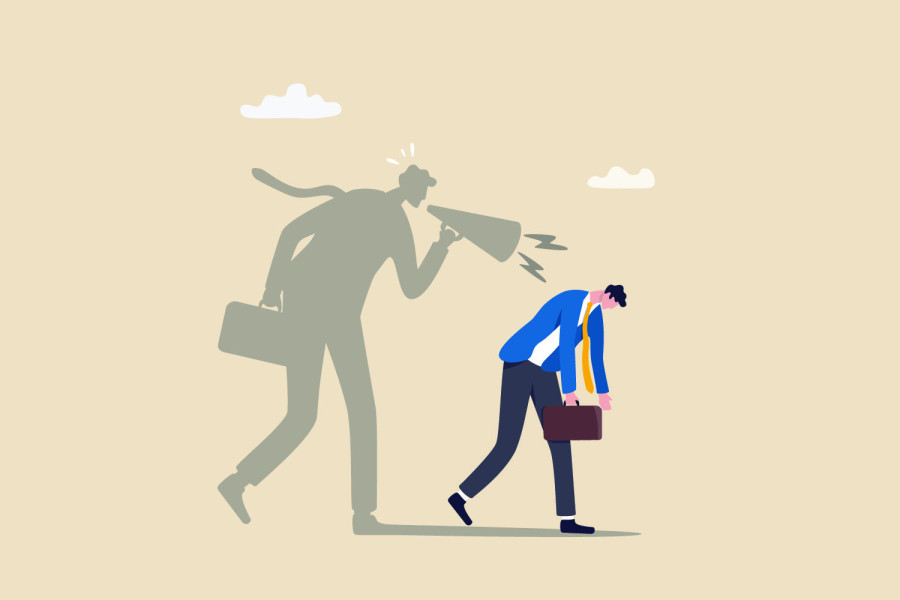Culture & Lifestyle
Getting over self-victimisation
This phenomenon is driven by emotional turmoil, and individuals might not realise they exhibit these behaviours.
Dristy Moktan
Let’s take a moment to think. Have you ever encountered someone who is always on top of their blaming game in every situation?
This behaviour is often a form of self-victimisation. Lots of emotional distress fuels it, and individuals may not be able to comprehend that they are doing so.
This is an underrated topic regarding our healing journey, but it is an important one that can’t be overlooked.
Self-victimisation is seeing oneself as being in a disadvantaged position every single time. This state is characterised by a person constantly perceiving themselves as a victim, feeling like a victim, or holding “victim beliefs” due to other people's actions, their surroundings, or external events.
They put themselves in a position where they feel like everything and everyone is out to get them, seeing themselves as miserable even when it was/is in their power to make changes for the better.
Sometimes, people develop this tendency as a coping mechanism to protect themselves from extreme harm by declaring themselves to be sufferers of their challenges.
Self-victimisation is often a heavily misunderstood topic. Self-victimisation doesn’t imply someone hasn’t faced challenges; rather, it all comes down to how they understand and respond to those obstacles.
There is a difference between being a victim of a situation and adopting a victim mentality. While someone who has been wronged deserves empathy, adopting a victim mentality can become self-destructive in the long run, eventually taking a toll on their mental health.
Things don’t always go as planned in our daily lives, and our days are often full of uncertainties and challenges. For example, we might feel like our hard work is being ignored when we don’t get the promotion or feel disheartened when a heartfelt message to a friend goes unanswered.
Now, the question is, how do we handle these situations? Do we see them as personal attacks on our hard work, or do we consider other factors, like our friend being busy and not having time to respond yet?
If we find ourselves more inclined to focus on the misfortunes and emphasise only the negative experiences, viewing ourselves as disadvantaged, then we should consider taking a pause and reflecting on such thoughts.
Most people acknowledge these uncertainties and move on with their lives.
However, if we see ourselves as perpetual victims, it is time we detach ourselves from this ongoing feeling and reattach the concept that our lives are entirely under our control.
The practical approach to understanding the sense of being a victim is to focus on the individual’s perception of his/her unpleasant experience. However, research also states that this concept is not just limited to self-perception but also includes how society views it.
People having a self-perception of victimhood may get deeply impacted by the disadvantaged situations and may start composing messages inside their heads, somehow convincing themselves that they have always been in an unfair position.
This conversation with themselves may look something like, “I deserve to be in this difficult situation because nothing good ever happens to me.”
“Why do I even try when nothing works out for me? Why do I have to suffer every time? Am I a bad person?”
These self-limiting conversations can, over time, hamper one’s ability to bounce back, making it harder for one to heal and move forward. The very concept of negative self-talk frees one from the sense of responsibility that is often missing in such a mindset.
Additionally, it is also common for people who are embedded in this cycle to feel a strong sense of powerlessness or learned helplessness.
Such a mindset is often linked to people who have experienced deep psychological pain, blinding them from realising that change is possible.
The issue with self-victimisation is that it can create a never-ending cycle where one finds excuses not to act, believing they are powerless to make any changes.
Until this mindset has been altered, there will be no change in their lives, which will lead to them encountering circumstances in which they feel disadvantageous. However, we can slowly make little leaps toward our healing journey of escaping the grip of this mindset.
One of the most effective techniques is embracing responsibility and taking ownership of our actions and choices.
We can’t control what happens to us, but we can choose how we react to it and, more so, how we react to similar situations in our lives. While acknowledging past challenges, identifying areas where we can make changes can be helpful in the coming days.
Other mindful practices that can break us free from this cycle include learning to forgive, practising gratitude for even the smallest things, keeping our focus on the present rather than the past, and not being afraid to ask for help when we need it.
Remind yourself that the healing process takes time, so be patient with yourself. Regaining control over this mindset is very much possible—there’s a strong you waiting to emerge.




 22.12°C Kathmandu
22.12°C Kathmandu















